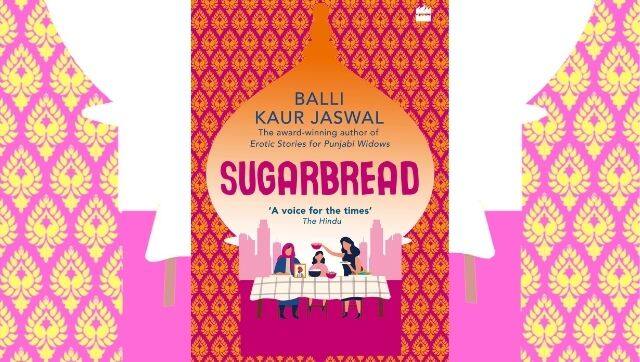In Sugarbread_, award-winning author Balli Kaur Jaswal writes the story of Pin, a 10-year-old who is warned against becoming anything like her mother, Jini. She is puzzled and curious because nobody would tell her the reason for this and searches for clues in the food prepared by her Ma. Things start to heat up when Pin’s grandmother comes to visit. Slowly, old secrets are revealed and Pin must try to face the truth._ Through the young protagonist’s observations, the author of works such as Inheritance and Erotic Stories for Punjabi Widows_, delivers prose that not only captures the tangles within a family but also turns food and delicious recipes into powerful metaphors depicting complex emotions._ The excerpt that follows describes Jini’s relationship with food and how her daughter Pin learns to spot hidden meanings in her mother’s cooking. *** In our house, food was not just prepared and eaten to satisfy our appetites. Ma created meals based on her mood, the weather or unusual events. I always chewed my meals carefully, tasting for clues. Cabbage leaves soaked in sweet coconut gravy told me that Ma was feeling mellow. Perhaps it had rained that afternoon and I hadn’t noticed it from the classroom window at school. Bay leaves and sour sauces were signs of sophistication—Ma was inspiring me to leave the narrow hallways of this block of flats where neighbours eavesdropped and tripped over each other’s shoes. Cinnamon sticks were Ma’s way of comforting me when she noticed a flaw in the way the world worked and she was softening the blow. The sharp tang of cumin added to any dish meant that Ma was bothered about something. There were many cumin dishes. [caption id=“attachment_8804081” align=“alignnone” width=“640”]  Author Balli Kaur Jaswal’s Sugarbread tells the heartwarming story of young Pin and how she looks for hidden meanings in her mother’s cooking. Image via Facebook[/caption] Daddy was the one who taught me how to find the hidden meanings in Ma’s food. He said that it was a useful skill, especially when she was upset. The first time he told me about it, I was excited. I thought I would finally be able to figure Ma out. But all I discovered were her emotions. I could taste anger in the amount of red chilli powder and mustard seeds she sprinkled in a curry and I could tell that she was happy when she roasted chicken with light soy sauce and anise seeds, and served it over white rice. But I ached to find out more about Ma. She was full of secrets. I had known that from the very first time I saw her standing at the window, gazing intently at the buildings in the distance and the sky beyond that. She did this often, becoming oblivious to everything but the wide sky ahead of her. I was never sure if she was looking at something or looking for something. “Your Ma does not always say what she’s thinking or feeling,” Daddy said. “But when she cooks, she puts her whole mind and heart into the food and you’re bound to learn something about her.” So I searched for Ma in her spices and sauces, her mixed vegetables and her sweet desserts. Ma had only started making the market a part of our regular Sunday routine when we stopped going to the Sikh temple. I couldn’t decide which one I disliked more. I didn’t mind wearing a salwaar-kameez or keeping my head covered and my feet bare. I liked the quiet peace of the prayer hall with its separate sections for men and women. I pretended I was a celebrity when I walked down the strip of dull red carpet and bowed low in front of the large Holy Book and the bearded priest who loudly read the script and never looked up. I could bear with the service—sitting cross-legged under fans that chopped the air, listening to the creaky accordions leading the hymns. But I dreaded eating at the temple, and for this I was sure that God would punish me. Temple food was charred roti—wheat flour and water rolled into a soft dough, flattened and cooked on a flat iron stove. Cauliflower and potatoes mixed with spices and lumpy dhal were stirred in massive pots and pans over huge blue flames that flared like upside-down skirts. Thin, runny yoghurt contained strips of carrot and cucumber. They hadn’t been cooked by Ma. The women in the back kitchen lived on gossip, trading stories about their friends’ children and marriages. I always heard them talking when I walked in to put my plate in the sink. Once, one of them had caught my eye as I passed her and nudged her friend. “Isn’t that…?” she asked. Her voice wasn’t low enough. On the way home, I recalled the taste of their food in my mouth, dry and sour like their hushed gossip, and I told Ma I could no longer eat at the temple. [caption id=“attachment_8804111” align=“alignnone” width=“640”]  Balli Kaur Jaswal’s Sugarbread has been published by HarperCollins India.[/caption] “It’s God’s food,” Ma always said firmly, like that was an explanation for anything. I was to be thankful for being Sikh, she reminded me, because in our religion, everybody was treated equally when it came to eating. “Old and young, poor and rich—as long as you believe in Him, you are welcome to dine at the temple.” I had to admit that it was quite generous of God to feed everyone. But I still wished He would make His food a bit more appealing. Whining around Ma was not a good idea; she didn’t tolerate it. The above extract from Balli Kaur Jaswal’s Sugarbread has been reproduced here with permission from HarperCollins India.
In Sugarbread, through the young protagonist’s observations, the author delivers prose that not only captures the tangles within a family, but also turns food and delicious recipes into powerful metaphors depicting complex emotions.
Advertisement
End of Article


)
)
)
)
)
)
)
)
)



